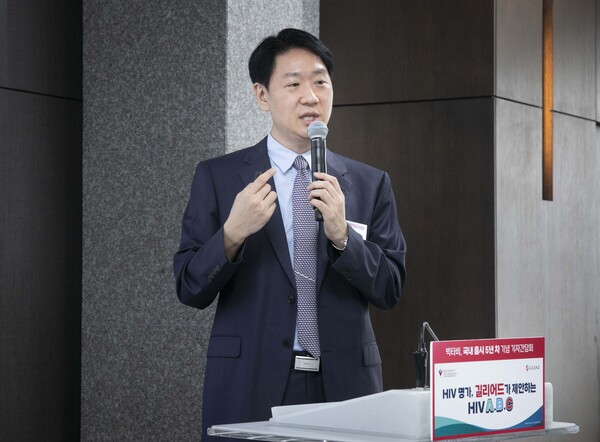A local human immunodeficiency virus (HIV) expert stressed the need to improve social awareness of HIV and infected people to increase diagnosis.

"HIV is a chronic disease, and the importance of long-term treatment for lifelong management is emerging," Professor Chin Bum-sik of the Center for Infection Diseases at the National Medical Center said during a press conference hosted by Gilead Sciences Korea to mark the fifth anniversary of the launch of HIV treatment Biktarvy in Korea on Wednesday.
Chin stressed that with the development of early treatment, the life expectancy of people living with HIV is similar to that of uninfected individuals.
However, while HIV treatment and retention in Korea is doing well, Chin stressed diagnosis rates have not kept pace with those in developed countries due to social stigma acting as a significant barrier to diagnosis.
"According to the World Values Survey, 92.9 percent of Koreans said they dislike having a neighbor with HIV," Chin said. "Considering that the average of the 64 countries that answered the same question was 38.4 percent, Korea's stigma toward HIV is very high."
Chin explained that changing social stigma is important as Korea has recently seen an increase in new HIV infections.
"While the number of new HIV infections dropped to 773 in 2021 when health centers focused on Covid-19 diagnosis, the number rose slightly to 816 in 2022, when health centers resumed HIV testing," he said. "As a result, it is necessary to improve social awareness quickly to confirm exactly how many patients are in Korea."
To address this, Kim called for the spread of the "U=U" (Undetectable=Untransmittable) campaign, which is a campaign that highlights the fact that HIV cannot be transmitted to others if the virus is undetectable in a patient's blood through proper treatment.
"Knowledge of U=U has been shown to reduce negative feelings and thoughts and increase adherence among people living with HIV," he said. "Addressing discrimination and stigma is one of the most urgent challenges in the HIV field, as improving HIV awareness ultimately affects treatment outcomes."
During the conference, Gilead Sciences Korea HIV Medical Advisor Lee Jeong-a also shared the five-year long-term data results and clinical value of Biktarvy.
"The five-year long-term data for Biktarvy a follow-up of Study 1489 and Study 1490, two randomized, double-blind, active-controlled phase 3 studies that evaluated the efficacy and safety of Biktarvy in 634 HIV-1-infected adults who had not previously received antiretroviral therapy," Lee said. "The data showed that 98 percent of patients on Biktarvy achieved and sustained virologic suppression (HIV-1 RNA less than 50 copies/mL) at week 240."
In both studies, there were no treatment failures due to resistance in the Biktarvy monotherapy arm, and the rate of treatment discontinuation due to treatment-related adverse events was very low at 0.8 percent, she added.

